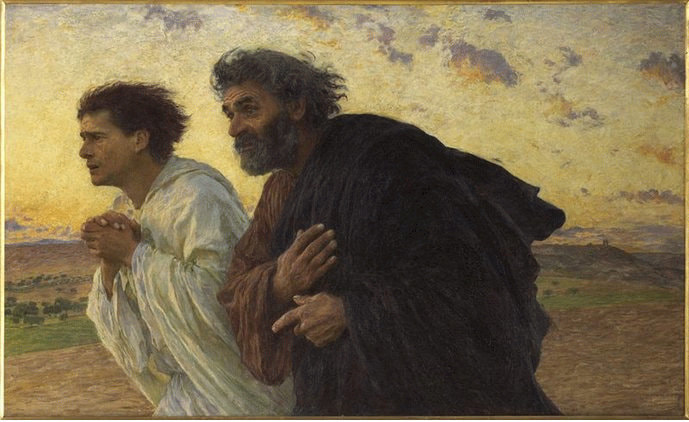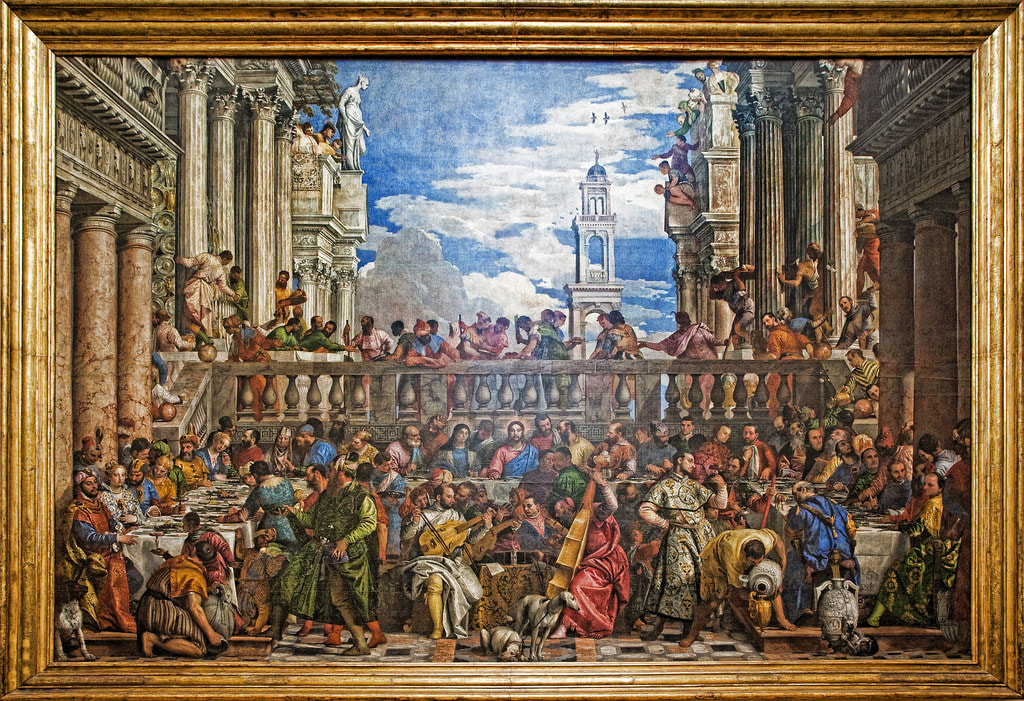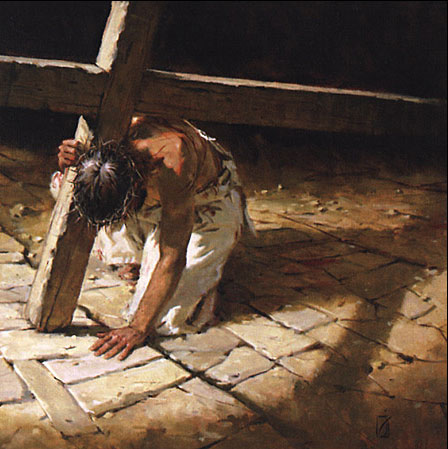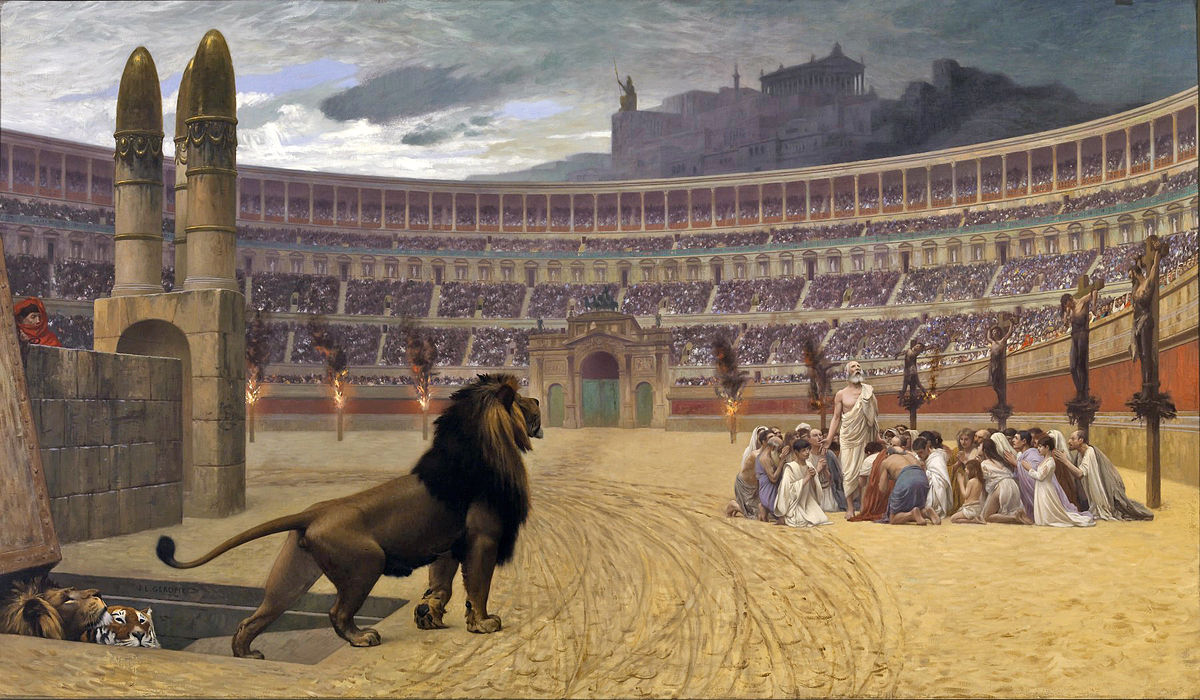|
“In the course of our Lord’s interactions with His disciples on earth He spared no pains to teach and train them, to renew and sanctify them. In most respects, however, they remained just what they were. The reason was that up to this point He was ever still nothing more than an external Christ who stood outside of them and from without sought to work upon them by His word and His personal influence. With the advent of Pentecost this condition was entirely changed. In the Holy Spirit He came down as the inward, indwelling Christ, to become in the very innermost recesses of their being the life of their life. This is what He Himself had promised in the words: 'I will not leave you orphans: I will come unto you. In that day ye shall know that I am in My Father, and ye in Me, and I in you.' This was the source of all the other blessings that came with Pentecost. Jesus Christ, the Crucified, the Glorified, the Lord from heaven, came in spiritual power, by the Spirit, to impart to them that ever-abiding presence of their Lord that had been promised to them; and that indeed in a way that was at once most intimate, all powerful, and wholly divine: by the indwelling which makes Him in truth their life (1 John xiv. 18, 20). Him whom they had had in the flesh, living with them on earth, they now received by the Spirit in His heavenly glory within them. Instead of an outward Jesus near them, they now obtained the inward Jesus within them.” Andrew Murray, The Full Blessing of Pentecost
0 Comments
As a consequence of [hearing Jesus talk about His flesh and blood being real food and drink], many of his disciples withdrew and no longer followed him. So Jesus said to the twelve, “And are you too wanting to go away?”
“Lord,” answered Simon Peter, “who else should we go to? You have the words of eternal life! And we believe and are convinced that you are the holy one of God.” (John 6:66-69) Are all three parts of Peter’s confession here your confession? 1) “Lord, who else should we go to?” – Having lived, having struggled, having succeeded, having tasted what the world has to offer, have you become firmly convinced that there is no other safe-harbor for your heart and soul but this Jesus? The reality: Until we actually know this to be the truth, we will always continue to dabble with other destinations. 2) “You have the words of eternal life!” – Is that how sweet they are to you? Do you feel fabulously rich because you hold in your hands and actually possess His words and His Word? Do you know that every utterance of His lips imparts life: is life? Just consider some of the joy the Psalmists experienced as they gloried in both knowing and holding the words of our God:
"Help me, O Lord my God; save me in accordance with your love. Let them know that it is your hand, that you, O Lord, have done it." Psalm 109:26,27
It is our ongoing relationship with this kind of "He's-done-it-all" realization that will define the weight and worth of our lives. Our help and salvation, all the goodness, all that has held purpose and worthiness and true value - all of it - has come only from His hand. "You, O Lord, have done it!" Today, let's delight to believe that. "So be sure you do not refuse to hear the voice of God!" Hebrews 12:25a
A statement that implies its own other-side-of-the-coin statement: "So be sure you do choose to hear the voice of God!" And, really, either statement assumes that human beings just like you and me are in a position of the will, as it pertains to the almighty voice of God, that we can either choose or refuse to open up our ears and hearts, listen for Him, and actually hear Him. I don't know if we all believe that. Our general outlook, even our day-to-day demeanor, says many of us don't. But what if the eternal God of Heaven is constantly speaking, sending out His thoughts and His will like a radiowave through our daily reality, and the only thing necessary to know His daily thoughts and will is to personally attune; simply, to listen? Wouldn't that make human existence a little more interesting? "Since, then, I heard of this faith of yours in the Lord Jesus and the practical way in which you are expressing it towards fellow-Christians, I thank God continually for you and I never give up praying for you; and this is my prayer. That God, the God of our Lord Jesus Christ and the all-glorious Father, will give you spiritual wisdom and the insight to know more of him: that you may receive that inner illumination of the spirit which will make you realize how great is the hope to which he is calling you — the magnificence and splendor of the inheritance promised to us — and how tremendous is the power available to us who believe in God." Ephesians 1:15-19
What a wonderful trio of goals for our day today: 1. To know more and more of Jesus 2. To realize how great is our hope and inheritance in the Kingdom of Heaven 3. To walk in the power available to us by His Spirit Shall we give these a try today? "You have not had to approach things which your senses could experience as they did in the old days — flaming fire, black darkness, rushing wind and out of it a trumpet-blast, a voice speaking human words. So terrible was that voice that those who heard it begged and prayed that it might stop speaking, for what it had already commanded was more than they could bear — ‘And if so much as a beast touches the mountain, it shall be stoned or thrust through with an arrow.' So fearful was the spectacle that Moses cried out, ‘I am exceedingly afraid and trembling.'" Hebrews 12:18-21
The reference here, obviously, is to both Moses and the Israelites' experience of the Presence of God on and around the environs of Mount Sinai. And what, are we told, was that experience like? Flaming fire, black darkness, rushing wind, a trumpet-blast, a voice speaking human words that was so awesome that those who heard it begged and prayed that it would stop: overall, a spectacle so fearful that it terrified and caused trembling. And what do you think made all of that so stupendously frightening? Well, put yourself in those people's shoes. They were going along through their lives, being about the business of their days, when all of the above suddenly happened to them, from the outside, absolutely externally. Normal human life was accosted by the full weight of the eternal. So what is - what should be - the difference now for us? Only, really, the location of all that. For we too – and the Church ever since Pentecost – have been lit with flaming fire, brought out of the black darkness into light; we have heard and received the rushing wind of the Spirit who summons and sends like a trumpet-blast; we have heard the Voice speaking human words to us – so wonderful that we’ve begged and prayed that it might never stop, so awesome that it terrifies and causes us to tremble – and where has all this occurred? Internally. Within. Inside us. Right inside the chest of the reader now reading this sentence. One of the greatest differences between the Old and New Testaments is simply the stage upon which the drama then/now occurs. Now, the normal human life of the followers of Jesus of Nazareth has been invaded and infused by the full weight of the eternal. Your human spirit is this generation's Mount Sinai: the sights, the sounds, the words of the Kingdom of Heaven on display. The Disciples Peter and John Running to the Sepulcher on the Morning of the Resurrection, Eugene Burnand, 1898 What if our lives today are the only proofs people get that the Resurrection of Jesus actually happened?
“And now even to this day in [Cana] and in the villages near by, the word of our Guest is still remembered. And they say, ‘The spirit of Jesus of Nazareth is the best and the oldest wine.’” Kahlil Gibran, Jesus the Son of Man The Wedding at Cana, Paolo Veronese, 1563
"Let it be your ambition to live at peace with all men and to achieve holiness without which no man shall see the Lord. Be careful that none of you fails to respond to the grace which God gives, for if he does there can very easily spring up in him a bitter spirit which is not only bad in itself but can also poison the lives of many others. Be careful too, that none of you falls into impurity or loses his reverence for the things of God and then, like Esau, is ready to sell his birthright to satisfy the momentary hunger of his body. Remember how afterwards, when he wanted to have the blessing which was his birthright, he was refused. He never afterwards found the way of repentance though he sought it desperately and with tears." Hebrews 12:14-17
What I find interesting about these verses, apart from their tone, is the way that the writer gives us three different challenges, each of which is a balance between earthly things and heavenly things, and each of which is impossible unless we're totally serious about that balance. Here's the three juxtapositions I'm noticing: 1. Peace with all men/Holiness 2. Non-robust response to grace/Bitterness of spirit 3. Falling into impurity/Non-seriousness about the Birthright-blessing And just so this doesn't read like some academic exercise, let me put my point into three questions around those balances:
So what comes first; what is primary? Things like abiding in His holiness, responding fully to His grace, founding our lives upon our new-birthright because it pleases God: because God desires it. So then, what would be secondary? Things like abiding in His holiness, responding fully to His grace, founding our lives upon our new-birthright because these heavenly realities are life to us, our new life within the veil. And so, you see, it's only out of learning to please Him and fully grasping what's ours in the Kingdom of Heaven that we have any hope of these tertiary actions of loving the world around us. Hear me clearly: Our abiding in Him, first, means life for this world. And: Your personal intimacy with Jesus is the greatest force the world will ever reckon with. The departure point for every "theology" (θεός-λόγος: God-word: the Word of God: λόγος-θεός: Jesus) must be the Theology: that He, our God, not only humbled Himself to become incarnate and to die for us, but also that He would personally choose to inhabit us and now lives in us.
Truly, beware of any theology or theologian who doesn't constantly do business with the power of the Indwelling; for, as Jesus would remind you, "The Kingdom of God is within you." (Luke 17:21) You and I will not be able to continue on in the true faith, day by day, if our God is some unknowable externalized deity sitting up in the clouds. However, if we'll believe what the New Testament tells us - what Jesus Himself told us - then it's the knowable internalized Godhead operating within us that will carry us, day by day. Thank you, Jesus, for your life within our lives!
Hebrews 12:4-6 - "Your fight against sin has not yet meant the shedding of blood, and you have perhaps lost sight of that piece of advice which reminds you of your sonship in God:
‘My son, do not despise the chastening of the Lord, nor be discouraged when you are rebuked by him; for whom the Lord loves he chastens, and scourges every son whom he receives.'" With these words, the writer of Hebrews switches gears from talking about the joy of Jesus that carried Him through the cross to now talking about the day-by-day practicalities of our fighting for our own belief. And immediately he lands upon our first, and probably most major, stumbling-block: suffering. Has anyone reading this ever gone through something hard? (Okay, so we're all perfectly aware of what he'll be talking about...) But typically - and it doesn't matter what scale, what size, of challenge we're dealing with - when personal hardship comes, we tend to use that circumstance as the lens with which we'll now see God. "Oh, I can't afford to pay that bill" - He must not really be a good provider. "Oh, we haven't seen healing for that yet" - He must not really be capable of healing. Yet the writer of Hebrews, in using that quote from Proverbs 3, is challenging us to look through a totally different lens, not at God, but at those circumstances themselves: we are now, he would remind us, the sons and daughters of God; under His constant perfect care. "Oh, I can't afford to pay that bill" - but He's my Father: perhaps He's currently teaching me to trust Him more fully... "Oh, we haven't seen healing for that yet" - but He's my Dad: I know He loves me and thinks of my well-being constantly... And, to say it better than I ever could, let's conclude with my old pal Andrew Murray's thoughts on the subject: “We often say that temptations that come to us from our position in life, from the struggle to live, from the conduct of our fellow-men, draw us away from God, and are the cause of our falling into sin. But if we only believed that our Redeemer is our Creator! He knows us; He appoints and orders our lot; nothing comes to us but what He has in His hands. He has the power to make our circumstances, however difficult, a heavenly discipline, a gain and a blessing. He has taken them all up into the life-plan He has for us as Redeemer. If we would but believe this, how we should gladly meet every event with the worship of an adoring faith. My Creator, who orders all, is my Redeemer, who blesses all.” Perhaps it's that space between the things we say we believe and the things we actually believe that defines the gap between our modern lives and the LIFE we see occurring in the Early Church. Jean-Léon Gérôme, "The Christian Martyrs' Last Prayer," 1883
And Jesus came and said to them, “All authority in heaven and on earth has been given to me. Go therefore and make disciples of all nations, baptizing them in the name of the Father and of the Son and of the Holy Spirit, teaching them to observe all that I have commanded you. And behold, I am with you always, to the end of the age.” (Matthews 28:18-20) “The promise of this beautiful passage is not only fulfilled in the presence of Christ in the heart of the believer, which is a literal and glorious truth, but it is a presence with us. It is more than the spiritual consciousness of the Lord’s indwelling; it is His direct personality and constant companionship with all our life, and His omnipotent cooperation in all our needs. It is the presence of One who has all power in heaven and in earth, and Whose presence means the defeat of every adversary, the solution of every difficulty, the supply of every need.” A.B. Simpson, The Christ of the Forty Days
"For I have come down from Heaven, not to do what I want, but to do the will of him who sent me. The will of him who sent me is that I should not lose anything of what he has given me, but should raise it up when the last day comes. And this is the will of the one who sent me, that everyone who sees the Son and trusts in him should have eternal life, and I will raise him up when the last day comes.” John 6:38-40
How often we hear people say, and even say ourselves, "Oh, I wish I knew the Lord's will" for some decision we need to make, or during a crisis, or on a question we’re presently pondering. But in these last two verses, Jesus tells us the Will of God: 1) that He "should not lose anything of what [the Father] has given [Him]" and 2) "that everyone who sees the Son and trusts Him should have eternal life." THE Will of God is to possess and redeem. How stunning! But did you notice that each of these will-of-God statements is binary: composed of two parts? The first part in each was different, but the second was the same: He will "raise [them] up when the last day comes." The word John uses there for "raise up" means just that - "to raise up" or "raise from the dead" - but it also has a lesser definition that goes beautifully with what we know to be one of the truest definitions of our lives-in-Him: "to produce a witness." THE Will of God is to possess and redeem, that we might be raised up - raised from the dead, in fact - and produced as witnesses of what we know and have seen of Him. “But,” you might say to me, “it would still help to know His particular will in this one particular decision I’m trying to make.” Well, here’s your decision-making grid: “I have come down from Heaven, not to do what I want, but to do the will of Him who sent me.” The “wants” of Jesus were nothing when compared to His delighted, intimate, listening, waiting-upon expectation of having the will of God daily revealed to Him. Can’t you see Him out in those lonely places in the pre-dawn hours, simply waiting and receiving word of the Father’s particular will for each particular day? May it be so for us as well! “Each morning is a new beginning of our life. Each day is a finished whole. The present day marks the boundary of our cares and concerns (Mt. 6:34; Jas. 4:14). It is long enough to find God or to lose him, to keep faith or fall into disgrace. God created day and night for us so we need not wander without boundaries, but may be able to see every morning the goal of the evening ahead. Just as the ancient sun rises anew every day, so the eternal mercy of God is new every morning (Lam. 3:23). Every morning God gives us the gift of comprehending anew his faithfulness of old; thus, in the midst of our life with God, we may daily begin a new life with him.” Dietrich Bonhoeffer, Meditating on the Word
From Acts 2 with some notes -
When the Pentecost crowd heard [Peter's message] they were cut to the quick – “cut to the heart,” assailed by the conviction of the Holy Spirit – and they cried to Peter and the other apostles, “Men and fellow-Jews, what shall we do now?” Peter told them, “You must repent – meaning, "alter the purpose of your life" – and every one of you must be baptized in the name of Jesus Christ – something never done before in human history – so that you may have your sins forgiven – a promise that Peter received directly from Jesus in Luke 24’s words, “So must the change of heart [the repentance] which leads to the forgiveness of sins be proclaimed in his name to all nations, beginning at Jerusalem” – and receive the gift of the Holy Spirit. For this great promise is for you and your children — yes, and for all who are far away, for as many as the Lord our God shall call to himself!” To me, it’s fascinating just how boldly Peter proclaims “this great promise” – the receipt of “the gift of the Holy Spirit” for “all who are far away, for as many as the Lord our God shall call to himself” – when he himself had only just received this Holy Spirit! How could he know that these people would receive Him too? How could he be so bold as to promise them “this promise”? We might assume that he was leaning upon the prophecy from Joel 2 – that the Spirit would be poured out “upon all flesh” – or that, in real time, he was remembering Jesus’ Holy Spirit teachings from John 14, 15 and 16. Perhaps. Or maybe just maybe this former fisherman, this present vessel of the Holy Spirit of God, is now receiving his orders directly from the Throneroom of Heaven. Again, as Jesus had said: “Yet when that one I have spoken to you about comes — the Spirit of Truth — he will guide you into everything that is true. For he will not be speaking of his own accord but exactly as he hears, and he will inform you about what is to come.” And just as thrilling: “When they bring you before the synagogues and magistrates and authorities, don’t worry as to what defense you are going to put up or what word you are going to use. For the Holy Spirit will tell you at the time what is the right thing for you to say.” (Luke 12) Just as surely as the Father and Son discuss their plans in the Holy Spirit’s hearing, so surely does the Holy Spirit hear and speak what He has heard to us; and so surely may we learn to hear and speak, just as He has heard and spoken, so that all men may know the Good News of Jesus. Peter is not winging it in his Pentecost message. Peter is our first pattern for how we should learn to listen… and then speak.
“The heart of the Christian faith is simple but quite revolutionary. It is that a man’s relations with God are no longer a matter of obedience to an ‘external’ God, but a willingness to be led by God’s own Spirit within him. Reconciliation with God is made possible by Christ, who is God as well as man, for, to use St. Paul’s words, 'God was in Christ reconciling the world unto himself.' And it is by believing in a living Spirit within us that we can know the friendship of God and can experience his power and love actually operating within ourselves.” J.B. Phillips, Good News
"By faith Moses led the exodus from Egypt; he defied the king’s anger with the strength that came from obedience to the invisible king. By faith Moses kept the first Passover and made the blood-sprinkling, so that the angel of death which killed the first-born should not touch his people. By faith the people walked through the Red Sea as though it were dry land, and the Egyptians who tried to do the same thing were drowned." Hebrews 11:27-29
Have you ever stepped far enough outside your sense of historical inevitability - meaning, "Well, of course the Bible stories happened that way" - to realize that these are not stories, that the people involved did not know they were "in the Bible," and that, frankly, these incidences are crazy and these people probably looked insane? A friend was sharing that thought with me last week: the look of sheer insanity comprised by so many of these "faith moments" in Hebrews 11. And so here we go again: A formerly royal shepherd demanding release for his enslaved people, goods being painted in blood to ensure freedom from the darkness of death, and millions of refugees crossing through a Sea because of one man with arms outstretched at back of them. But, let's be honest, what does our faith look like? It looks like our King of Kings, our Good Shepherd, earning eternal release for all enslaved people everywhere. It looks like lives painted in blood, washed in blood, so that full freedom from death might be theirs who would choose to believe. It looks like millions upon billions of lost broken refugees crossing forevermore from death to life because of one man with arms outstretched at back of them. Faith means faith to actually believe the fullness of the Gospel. Unbelief is always getting stuck upon one's own salvation. Oh, may we grasp the fact that we have, today, once and for all time, entered into the Kingdom of Heaven... forever and ever! "Later on, Jesus went out and looked straight at a tax-collector called Levi, as he sat at his office desk. 'Follow me,' he said to him. And he got to his feet at once, left everything behind and followed him." Luke 5:27,28
It seems to me that Levi doesn't leave everything at Jesus' "Follow me" simply because of Jesus' authoritativeness in calling him. Generally - wouldn't you agree? - when we leave something behind for something else, we believe that what we're gaining in the exchange will be something better. Levi must have seen something of the reality of who Jesus was in His eyes, in His voice, in His person, and felt that all he had was nothing compared to what he was going to gain. Something about Jesus always whispered the entirety of the Kingdom. Do our lives have that essence? In the Early Church, “…an immediate revelation of the mind of the Master was the one pressing religious need for which all craved.” Thomas M. Lindsay
The Church and the Ministry in the Early Centuries "All these whom we have mentioned [Abel, Enoch, Noah, Abraham & Sarah] maintained their faith but died without actually receiving God’s promises, though they had seen them in the distance, had hailed them as true and were quite convinced of their reality. They freely admitted that they lived on this earth as exiles and foreigners. Men who say that mean, of course, that their eyes are fixed upon their true home-land. If they had meant the particular country they had left behind, they had ample opportunity to return. No, the fact is that they longed for a better country altogether, nothing less than a heavenly one. And because of this faith of theirs, God is not ashamed to be called their God for in sober truth he has prepared for them a city in Heaven." Hebrews 11:13-16
Can you sense how much the writer of Hebrews is using language so consciously here, language that is certainly just as much aimed at our heavenly vision as it is of the Old Testament saints? Me, I love it. I love the picturesque bravery of these people as they wandered the earth. I love the imagery of that heavenly city - that other country - to which their hearts were aimed. Oh, I love it all! You see, friends, this is us. We are meant to be these people. After all, the definition of our human lives will always come from our life's deepest desires. So what do we want? What do we want this particular workweek? Would we be the ones who maintain our faith and live while actually receiving God’s promises, having heard of them from a distance, and having hailed them as true and then living as the proofs of their reality? Would we freely admit that we live on this earth as exiles and foreigners; for our eyes are fixed upon our true heavenly homeland? Have we finally let go of the old life, the particular country we left behind, to which we want no opportunity to return? For, yes, let us grasp the fact that our hearts are longing for a better country altogether, nothing less than the heavenly one – where Jesus Himself calls us! And because of this faith of ours – this daily growing belief-muscle that we’re learning to flex – God is not ashamed to be called our God for in sober truth He has already prepared for us a city in Heaven! It isn't actually possible to "overspiritualize" life and all the situations in our lives. It's just that we've grown so adept at underspiritualizing everything that we find it feeling strange when the truly spiritual fully breaks through.
It's all, truly, spiritual. Our lives are the conduit by which He still reaches the world. Let us live a full day believing those facts. |
Themes
All
Archives
July 2024
|





 RSS Feed
RSS Feed
